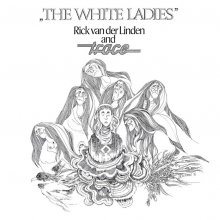MENNO VON BRUCKEN FOCK
THE WHITE LADIES (E, 1976), heruitgave

The third album by Dutch band Trace called The White Ladies, is what would be their swan song. The story is based on the myth De Witte Wieven, which originates from the eastern part of the Netherlands. Drummer Ian Mosley and bass player Jaap van Eik kind of lost their interest in the band at the end of 1976, because their income depended on playing rather than composing and keyboardist Rick van der Linden wanted to continue his musical career focusing on his composing skills rather than being a band member. He released his solo album Rick van der Linden plays Albinoni, Bach and Händel (1976) with the help of the National Philarmonic Orchestra conducted by Job Maarse. He decided to ask his former members of Ekseption (Cor Dekker on the bass, Dick Remelinck on saxes and flute and Peter De Leeuwe on drums and guitars) to play on the next Trace-album and he asked Job Maarse to arrange and produce The White Ladies. For this occasion he also invited The Benny Behr Strings, a studio ensemble conducted by Maarse. Finally he secured the aid of Harry Schäfer (narration) and vocalist Hetty Smit. This collaboration resulted in an album with nineteen pieces all composed by Van der Linden, partly adapted from works by Beethoven. To emphasize his role in the project and the status of Trace, the subtle change in the band name tells it all: Rick van der Linden & Trace. This enhanced and carefully remastered version contains one live piece and thirteen demo recordings as bonus tracks. The big difference between The White Ladies and the albums Trace (1974) and Birds (1976), is that the music is much more classically orientated, more symphonic, less jazzy and there's hardly room for extravaganzas and improvisations. Legend (part one) is a very gentle tune in the vein of a slower piece by Ekseption, interrupted by Schäfer’s voice. In a nutshell he tells the tale of the White Ladies: a farmer’s wife who decides to leave her child and husband to dance with the White Ladies and be free of all human sorrows. A dark and bombastic keyboard interlude leads to the rather cheerful Confrontation, featuring Rick’s harpsichord, organ and flute samples. After another keyboard and drums interlude accelerating in tempo, there’s one of the finest tracks of the album: Dance Of The White Ladies. Lush keyboards, mostly synths, and Remelinck’s saxophone rendering a slightly jazzy touch to the music. Without interruption a slower more symphonic piece follows called Doubts, focused on piano, flute samples and strings. There are some hardly noticeable irregularities in these recordings, but these last only for a few seconds. A medieval trumpet ‘ensemble’ is the prelude for another highlight: Witche's Dance, a track based on a composition dating back a few years. Dekker demonstrates his skills on the bass guitar, De Leeuwe on the drums and Van der Linden does a lot of overdubs on several keyboards. The arrangement with contributions by Remelinck really reminds me of Ekseption! Surrender also reminds me of Ekseption, like in Legends the music is symphonic, majestic and the melody is played by the sax. The third interlude is equally dark and scary like the previous two and leads to Pathétique, based on Beethoven’s sonatas. The tracks seems a piano solo at first, but then drums, bass, organ, harpsichord, sax and the string ensemble are added. In Legend-part Tto, Schäfer explains how the farmer plans to rescue his wife from The White Ladies. Rescue is an uplifting faster track with a more bluesy interlude and closed off by a classical piano piece. A similar piece as performed by ‘trumpets’ is performed on the organ with some percussion. Back Home is a tune that might as well been on an album by Ekseption: obviously there are a lot of classical influences and there’s a more jazzy interlude featuring Remelinck’s saxophone. Meditation is a very melancholic piece featuring Mellotron-flutes - like on Strawberry Fields - and the acoustic guitar. Flashback is a half-minute interlude, played by piano, bass and drums. In Conclusion the same theme as used in Meditation returns, but this time with the string ensemble.
Bonus tracks:
As could be expected, the first piece is pure classical, featuring a whole range of keyboards without any other instruments. The Interlude is less dark or scary since Van der Linden uses the Mellotron, sounding like the famous intro to Genesis’ Watcher Of The Skies. The version of Dance Of The White Ladies is almost solely a piano solo, only Mellotron- strings have been added. In Doubts it’s an all keyboard demo, sounding very friendly and symphonic. The demo of Witches’ Dance is the basic version with only Rick’s piano. Both Pathétique as well as Legend and Meditation are lovely tunes, the first of course by Beethoven. All performed with drums, bass and piano. The next Interlude as well as Flashback are also performed by piano, bass and drums, just as both demos of Back Home, in these versions sounding really cheerful yet mellow and with a somewhat jazzy interlude in the first demo. Conclusion is a very sweet lean version performed by organ, bass and drums. The grand finale is a live version of Fugue (J.S. Bach) played on the church organ in Arnhem, yet again a very convincing statement of the talents and versatility of Rick van der Linden.
With the talents of Jaap van Eik, Pierre van der Linden, Ian Mosley and Rick’s former bandmates in Ekseption, this trilogy of Trace comes finally in decent releases. Overall superb sound quality and a lot of interesting bonus material means a worthy homage to one of the greatest keyboard players from the Netherlands!